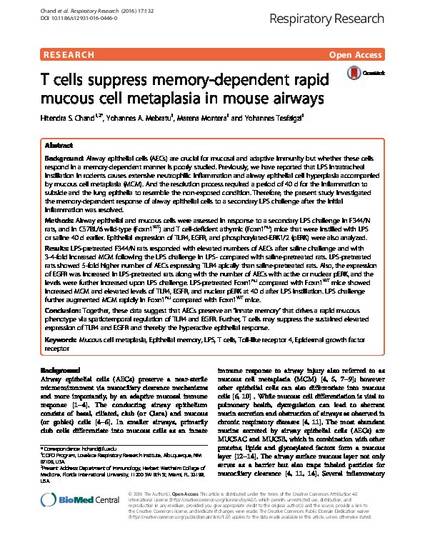
Background Airway epithelial cells (AECs) are crucial for mucosal and adaptive immunity but whether these cells respond in a memory-dependent manner is poorly studied. Previously, we have reported that LPS intratracheal instillation in rodents causes extensive neutrophilic inflammation and airway epithelial cell hyperplasia accompanied by mucous cell metaplasia (MCM). And the resolution process required a period of 40 d for the inflammation to subside and the lung epithelia to resemble the non-exposed condition. Therefore, the present study investigated the memory-dependent response of airway epithelial cells to a secondary LPS challenge after the initial inflammation was resolved. Methods Airway epithelial and mucous cells were assessed in response to a secondary LPS challenge in F344/N rats, and in C57BL/6 wild-type (Foxn1WT) and T cell-deficient athymic (Foxn1nu) mice that were instilled with LPS or saline 40 d earlier. Epithelial expression of TLR4, EGFR, and phosphorylated-ERK1/2 (pERK) were also analyzed. Results LPS-pretreated F344/N rats responded with elevated numbers of AECs after saline challenge and with 3-4-fold increased MCM following the LPS challenge in LPS- compared with saline-pretreated rats. LPS-pretreated rats showed 5-fold higher number of AECs expressing TLR4 apically than saline-pretreated rats. Also, the expression of EGFR was increased in LPS-pretreated rats along with the number of AECs with active or nuclear pERK, and the levels were further increased upon LPS challenge. LPS-pretreated Foxn1nu compared with Foxn1WT mice showed increased MCM and elevated levels of TLR4, EGFR, and nuclear pERK at 40 d after LPS instillation. LPS challenge further augmented MCM rapidly in Foxn1nu compared with Foxn1WT mice. Conclusion Together, these data suggest that AECs preserve an ?innate memory? that drives a rapid mucous phenotype via spatiotemporal regulation of TLR4 and EGFR. Further, T cells may suppress the sustained elevated expression of TLR4 and EGFR and thereby the hyperactive epithelial response. Electronic supplementary material The online version of this article (doi:10.1186/s12931-016-0446-0) contains supplementary material, which is available to authorized users.
Available at: http://works.bepress.com/hitendra-chand/8/
